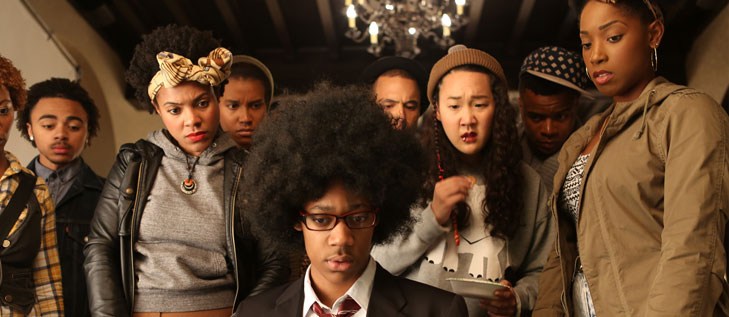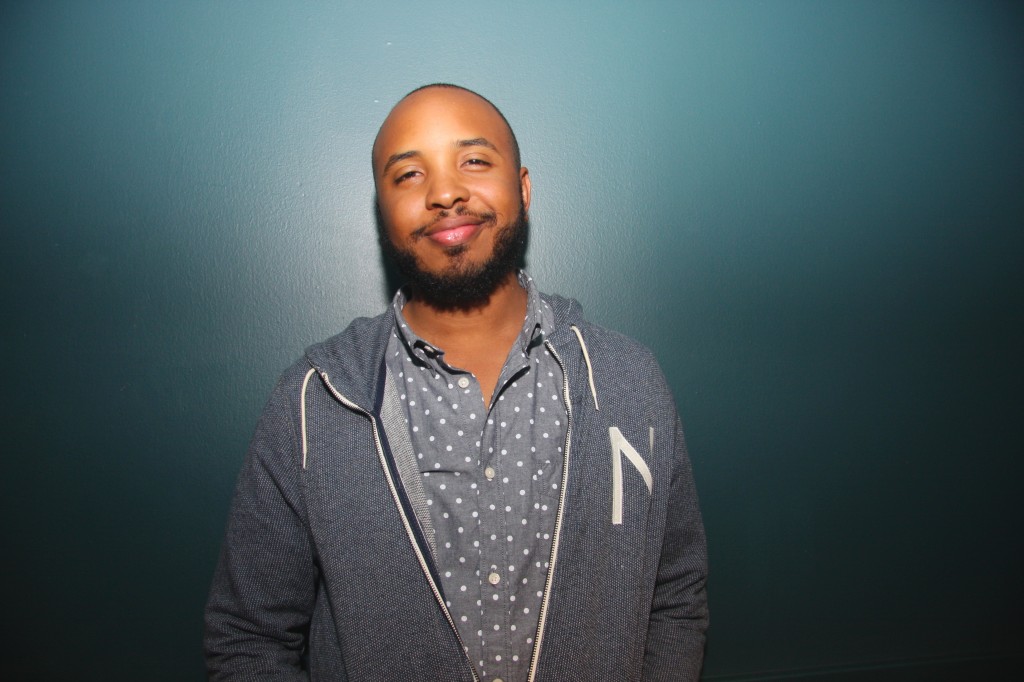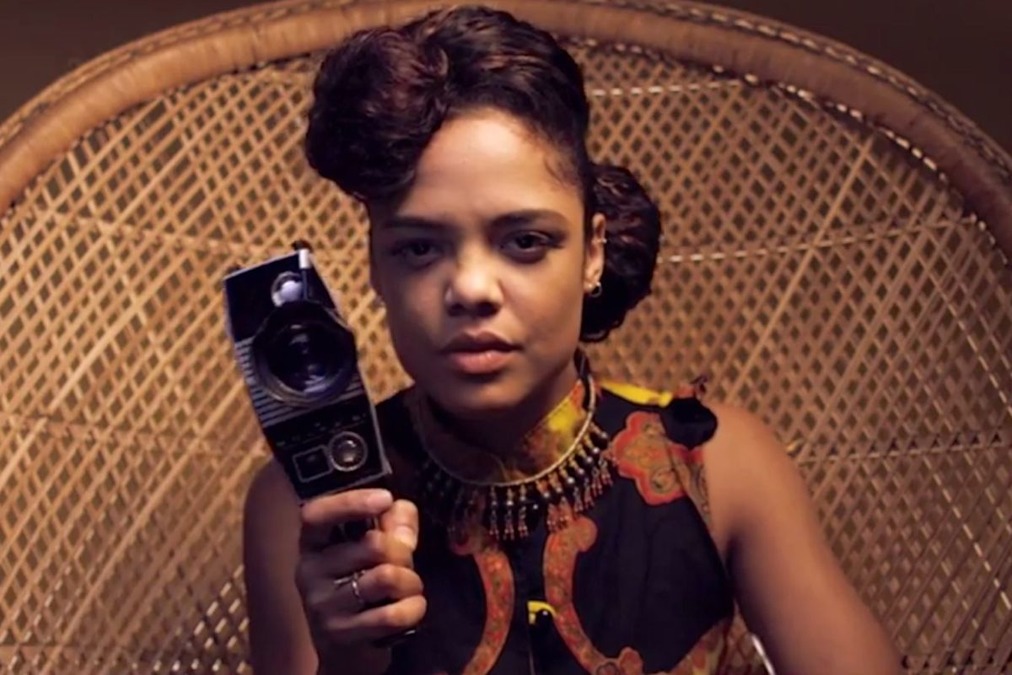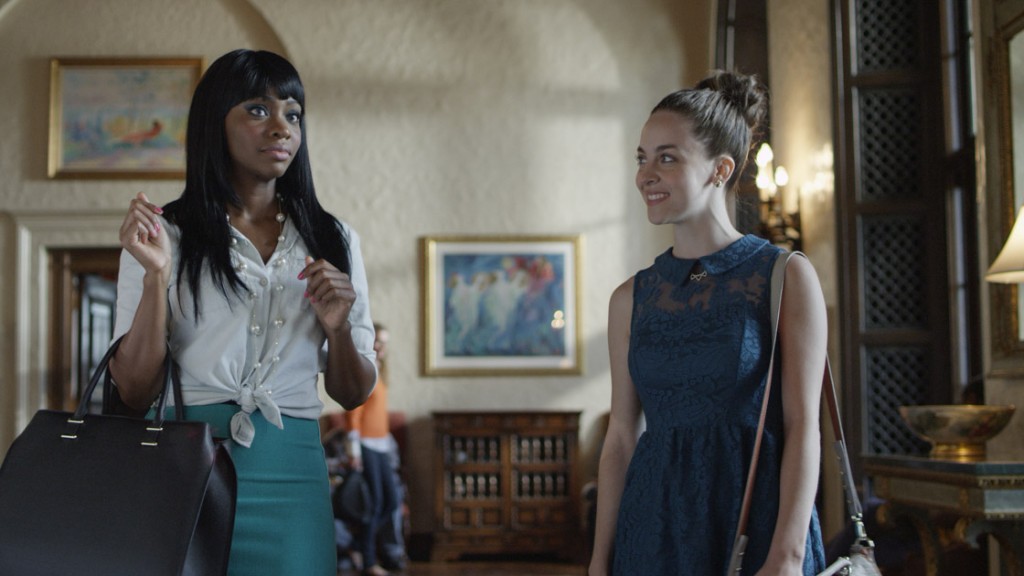
Sitting down with “Dear White People” director Justin Simien
Dear white people, this isn’t about you. With a title so precise and intentional, it was exhilarating to catch the SF premiere of Dear White People in April, all hype included. Set in a fictional Ivy League school, a group of black students find themselves on a journey to self-discovery in a lot of unexpected ways. The main protagonist, Sam, is a passionate young woman who has a radio show “Dear White People,” where she talks about racial microaggressions.
Director Justin Simien, who previously spent 8 years as a publicist, took this generation’s most profound inquiries head on in his debut film- intra/inter-race politics, sexual identity, identity in the age of social media, and media representation. Dear White People is our post-colonial Clueless– both a hilarious and honest reflection of what it means to find oneself under the pressures of institutions and social dynamics as built by white supremacy.
With a major distribution deal, it’s clear the world is listening. Let’s make sure they’re hearing it right.
Here we present part 1 of the interview sans spoilers:
Browntourage: What I really love about the film are the complex narratives within the whole plot- particularly surrounding film and social media. We get this meta inception narrative of how we’re fed stereotypical images and ideals in society, and then how these fictional characters in the film are grappling with them, then recreating them, and being subject to them. Do you think the way you embed social media into the film helps illuminate the complexity of identity in the digital age?
Justin: I think so, I think identity is the foremost issue of our time. Like how do we define ourselves particularly in a world where everyone has access now and everyone can have a presence nationally and internationally now, you know? We’re sort of hyperfocused on what our identity is. What is our twitter profile picture? What do we put on our instagram feed? And its a philosophical, existential question we’ve had since the beginning of time. There is a difference, and at times a conflict, between our identity and who we really really are. And I just happen to be talking about it from a black point of view. But it’s a human condition thing and I think social media is the latest and greatest manifestation of that issue. And for me that had to be a big part of it because that’s how we relate and communicate to each other.
B: Humor is an amazing tool for getting people’s attention. Why do you think making a comedy set in an ivy league environment was an important story to tell?
J: I think that we wanted to put them in a white dominated world where everyone was ambitious and the stakes were really really high. That’s what it feels like to me in America as a person of color trying to do something important with my life. When you want to do something big, on the world stage, wether you want to be a lawyer or make movies, you’re in a tank, for better or worse, and everyone wants it just as bad as you do. I wanted to speak to that American experience in a microcosm, and to me it made perfects sense.
B: In the film, there’s kind of a jab at Tyler Perry films. Have you had any responses from him?
J: Not directly. From what I can tell and from what I know, I actually think he’d find it kinda funny. Like he’s got islands haha, I think he’s ok. To me the movie isn’t a personal attack on Tyler as much as it is a genuinely honest expression of what black people talk about and how we tend to rally against the images of us that are out there. And it’s not really even Tyler’s fault! Tyler has an audience and they keep coming to see his movies so he should keep making them- what sucks is that the industry says ‘oh those are the only movies that we can make.’ That’s the problem. The industry that makes way for those movies and not others. It’s not Tyler.
B: In the bay area there’s a lot of tension with housing reform, there’s something similar alluded to in the film, lots of POC being pushed out of the city because of the tech boom, and then within that there’s talk of black versus brown. When I see the film, it really speaks to me- but there’s also tension in that I’m brown and not black.
J: I mean sure, there’s just so much more to say about the subject matter. If I had a television show we can get into it.
B: *shouting to a room of festival attendees* Somebody give him one!
J: We can really get into the issues of the other races on the campus. For me, this is my point of view because this is the skin I grew up in. And I just tried to tell the truth about the human condition from my point of view. And my characters- there’s tension between THEM about what it means to be black so of course there’s going to be tension between different minorities, so what happens is there’s really variations of the same experience.
You want to talk media? How much of this country is represented by Latino faces that you don’t see on screens? People send me audience studies all the time because I have a race movie, so whatever, but just the discrepancies between the audience that shows up for films and the actual way films are cast, produced, directed and written its just ridiculous– its obscene. To me I really mean it when I say art is meant to be a mirror to reflect our society and we’re holding up this false mirror to our people. Y’all should really be fed up with it! I hope I inspired other people to come forth with their stories. I’m not familiar with the brown community issues but to me it’s the same struggle. What’s that doc about women?
B: Miss Representation ?
J: Yes, that film blew my mind. Like how they say men and women wanna be the same thing until they reach age 12. Like damn, really? That’s our fault, that hangs on us. It’s important for me, from my corner of the world, to tell stories that reflect my truth, not the white mainstream interpretation of my truth.
B: With your Lionsgate distribution deal and a rising conscious generation looking for alternative institutions or paths, do you feel like that’s your mission? Or do you not want to be pigeonholed?
J: I mean my mission is to talk about the human condition as a storyteller. I’m put on this planet to tell the truth in some way about the human condition. It’s gonna come through a black lens, it’s gonna come through a gay lens, but that’s not only what I wanna talk about. We’re all facing the same shit. There are even white men who don’t feel like they live up to the white male mold given to us by society.
B: In a recent Ebony write up, the author writes that the main character Sam’s radio show took lazy jabs at white people, do you have a response?
J: Yeah, I mean ok. My job as a writer is supposed to write people the way that I think that they sound. I feel like Sam was responding to her environment the way that she would.
B: You were talking about pushing the edge in your writing during the screening’s Q&A. What’s a moment that you felt the edge and that oh shit moment that seduced you to keep going there?
J: Well let’s just say there were some things that didn’t make the film. Some people were like “Justin, I’m sorry boo but iono how you gonna do that. Not in your first movie, I dunno.” The blackface party to me is passé at this point because I’ve seen it so many times and it’s happening so many times. And I can’t tell you how many times there are people who’ve just seen the movie and are like shocked and appalled that this thing actually happens. I did what was edgy for me at the time, and it’s going to remain edgy for those people for however long it needs to be, and the next thing will push it even further. I never felt conflicted about any of the things I put on screen.
B: If there’s advice for aspiring filmmakers or how young people can consume media or participate in bringing the veil down a bit, what would it be?
J: Ok I know I’m gonna say this in a crunchy granola way, but if you’re an artist and you’re choosing between the thing that’s burning in your heart that makes absolutely no sense and the thing that you should do, always choose the thing that’s burning in your heart and makes no sense. That’s what this movie was for me. For a long time, I’d pitch and and people would say “I like it…but you’re never gonna get that movie made.” And of the things I’ve done, and I’ve done a lot of things, the ones that made the most sense- those never went anywhere. If you were really put here to make art, man, there’s something in you that’s gotta happen- just do it.
And another thing- I feel our culture has gotten really lazy. We’ve become accustomed to like entertainment as an escape which it is to a degree. but art is supposed to challenge you. it’s supposed to tell you a story that changes you because you know it’s true, and you weren’t ready to admit it until you saw this thing or read this book or went to this play or heard that poem. That’s what art is here to do. So as fun as it is to space out on things, never take it at face value. Particularly with minority audiences who are spoon fed the same shit over and over- we sort of forget how to watch art, we sort of forget that art is for us too. There’s lot of art house movies that have no people of color in them.
B: And there’s lots of resistance to the art house movement from a POC perspective.
J: Exactly.
H: Cuz it’s not supposed to be for me.
J: Yeah, but we are sophisticated and smart enough- our life experiences deserve to be tackled in that way. Don’t shy away from it.
B: Did y’all have to decompress with all the topics your were engaging with during filming? How did you do that?
J: I mean everyone processed in their own way. I already knew what movie I was making for a while so I already made peace with the subject matter. I had to decompress from the experience of shooting the movie cuz that was A LOT.
B: 21 days.
J: I can’t.
B: Did you even sleep.
J: I can’t even talk about it. Nope, did not. I don’t know what part of me came out to make that movie but after we were done it took me a WHILE to recover and get back to regular life. But its sort of an exquisite pain. It was horrible, difficult, it was grueling, and I can’t wait to do it again.
B: Awesome! I’m so stoked for your upcoming project, are you excited?
J: I’m super excited, I can’t wait to talk about it. I really can’t.
Dear White People opens today in select cities. You can catch part 2 of this interview after the national theatrical release on October 24th.


